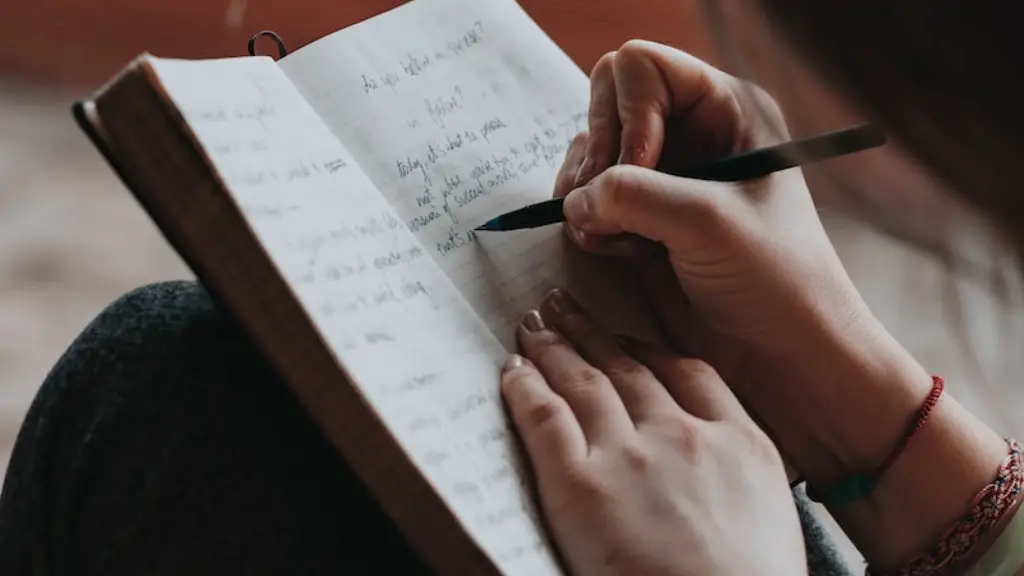Develop Your Ideation
When developing your poetry, the first step to improving your skills is to create and develop your ideation. This is the basis for your work and often the main creative challenge. Begin by thinking about topics that resonate with you and about what you’re passionate about. Make a list of the things that interest you and explore each one by reading, researching, speaking with experts and visiting culturally relevant sites. These experiences allow your ideas to expand and develop. Additionally, consider the tone or mood of your work. Ask yourself what ideas you want to communicate and which one of these ideas you would like to emphasise.
Acquire Knowledge and Read Poetry from Different Eras and Cultures
Learning about the history of poetry, both of your own culture and beyond, is another way to give yourself the ability to write better. Familiarise yourself with different poetic structures such as haiku and sonnet and explore the use of metaphor, imagery and rhythm in your work. By reading the work of the greats in their respective styles, you can broaden your capabilities and allow yourself to move beyond the boundaries of your own understanding. Moreover, by reading poetry from different cultures and eras, you can appreciate the universal language of poetry and explore how its used to express diverse emotions and ideas.
Practice Writing Poetry on a Regular Basis
As with any writing form, practice is the key to getting better at poetry. Writing regularly will help develop your skills and refine your individual techniques. This is one of the best ways to improve your work. Start with short pieces such as haikus or free verse and then experiment with different longer forms. Keep experimenting. Allowing yourself to explore different genres, structures and poetic techniques is a great way to build up your skill and your understanding. Additionally, write with a pen and paper instead of a laptop – the physicality of the process can lead to deeper connective thinking.
Get Constructive Feedback from Your Peers
Criticism is an important part of being a poet and there is no better way to get feedback then to share your work with other poets and writers. Get an opinion from your peers, even if it’s something as simple as them telling you what they enjoyed about your work. This kind of feedback allows you to grow and understand your work from an objective viewpoint. Additionally, attending poetry readings and joining poetry courses can give you the opportunity to get feedback from some of the best poets and writers.
Use Different Writing Exercises to Enhance Your Skills
Treating your writing like a physical workout can be a great way to improve your writing skills. Do different writing exercises to help your work remain varied and original. Assemble a portfolio of exercises you can use whenever you are feeling stuck and that can help you to hone your style. This is also an excellent way to come up with new ideas and build the basics of your poem.
Create Time and Space for Writing Poetry
Creating an environment specifically for writing poetry is an excellent way to improve your work. Schedule a couple of hours a week for creative writing and make sure that this time is distraction-free and uninterrupted. Use this time to write and scrutinise your work, and create a space solely dedicated to this practice.
Make a Commitment to Your Writing
Poetry requires dedication, practice and commitment. Regularly read new material and put time aside for creative writing. If you are looking to improve your skills, don’t be afraid to make a commitment to your work, to dedicate your time to the craft and create a space for yourself to learn and develop.
Know Your Audience
Any poet, whether they are writing for a specific context or audience, must understand their audience and how to reach them. Research and be informed about the readers who will be consuming your work and create a poem that they can relate to. Look at the themes that interest them and the importance of creating a context to the poem. This will allow you to better capture their attention and give your poem the power it needs to be more impactful.
Stay Informed and Draw Inspiration from Other Sources
The world is full of interesting ideas and there is no better way to improve your poetry than by keeping informed and drawing inspiration from other sources. Read articles, watch films and listen to podcasts that stimulate both your creativity and your understanding of the world. Additionally, look around for other creative outlets for inspiration and see how you can draw out their power for your work.
Focus on the Details and Take Time to Revise
The details left in your poem can make or break your work. Fine tune these aspects, from your metaphors and imagery to your use of form and language. Double check your grammar and spelling and look out for any gaps in your logic. If you can’t find the right words, don’t be afraid to go back and change them out. Take your time and don’t settle unless every aspect of your work is where you want it to be.
Be Open to Constructive Criticism and Learn from Your Mistakes
Regardless of how confident your work and your skill is, you will make mistakes and these are all an important part of the learning and development process. Poetry is something that you can continually try to improve on and there is always room for growth and development. Be open to constructive criticism, understand what your mistakes are and learn from them.
Build Confidence with Your Work
Confidence is absolutely essential for writing good poetry. Understanding yourself and your capabilities is the first step. Practice writing and make sure you take the time to appreciate your own development and what this means for your work. Additionally, seek out places where you can share your work, get advice, and constructive criticism. This can be done online or in person. Start by sharing your work on social media, or attending open-mike nights, or joining a writers’ group. All of these, along with your own writing, will help you to better understand your capabilities and gain confidence with your writing.
Focus on Self-Improvement and Keep Constantly Growing
The most successful poets are those who keep trying to better themselves, developing their craft and never settling for what they have accomplished. You don’t have to quit writing and start over, rather work on individual pieces over a length of time. Keep recording your development and practice different techniques to build better habits and grow as a poet. Don’t underestimate yourself and realise that the quality of your work reflects the effort you put in.
Be Flexible when Writing
You don’t have to write in a structured way and follow a single path. Poetry is a very flexible form and allows you to be creative and explore different aspects of your writing. If a piece isn’t working, do something else. If it’s not right, then change it. Through experimenting, you can discover a lot about yourself, your writing and the power of words.
Learn the Power of Editing
Editing and revising are critical elements of poetry and are often the difference between mediocre and exceptional work. Editing allows you to determine which aspects and sentences of your poem should stay and which ones should be removed. Make sure you space your reads out over a period of time. This allows you to come back to the piece and review it with fresh eyes, as well as knowing when to step away from it.
Practice Perseverance
Improvement takes time, practice and perseverance. Don’t give up at the first sign of difficulty – fix what isn’t working and make sure you don’t sacrifice the quality of your work. Keep focusing on the little details and slowly building your foundation of skills. Poetry is something that takes time to understand, but with the right attitude and perseverance, you can improve your skills and move towards being successful.
Remain Passionate and Keep Learning
Writing is a process and you should keep learning as much as you can about it. Read up on different techniques and writing styles, as well as learning from other writers. Above all, remain passionate about this process and what you are trying to achieve. When you feel stuck use this passion to strike up a new idea or finish an old one. This is what will keep you going and will guide you to bettering your work.
Understand the Process and Set Goals for Yourself
Understand the process of writing poetry and make sure you are in tune with it. Set realistic and achievable goals so that you have something to aim for. These goals must be within reach and help to keep you motivated. Celebrate your achievements and progress and keep striving towards your goals.
Learn Through Collaboration and Mindful Practice
One of the best ways to learn is to write with other poets. Writing with someone allows you to compare styles and gain insight into how others think. This can allow you to learn a lot about your own writing and its dynamics. Additionally, learn to practice mindfully and take the time to reflect on your process. When reviewing your work, be sure to pay attention to details and how they affect the overall structure. Lastly, remain open to any advice you are given, even if it might hurt your ego.





